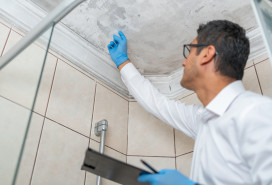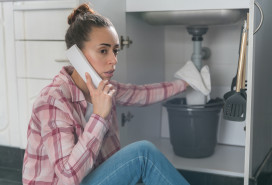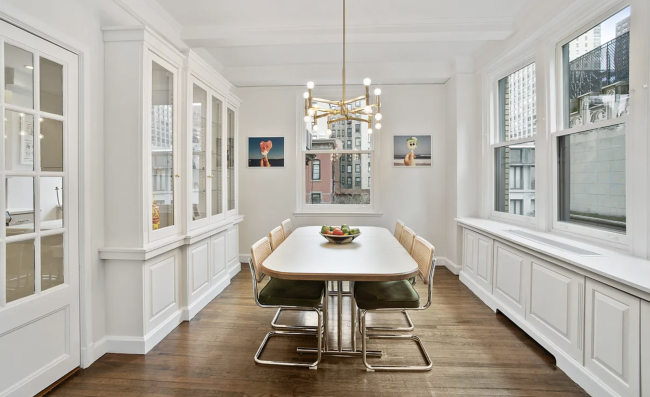What you need to know about buying a NYC apartment with direct elevator access
- They are common in co-op loft conversions as well as new-construction condos, mostly in Manhattan
- 'Anything that makes a place unique adds to the price these days'—and that includes private elevators
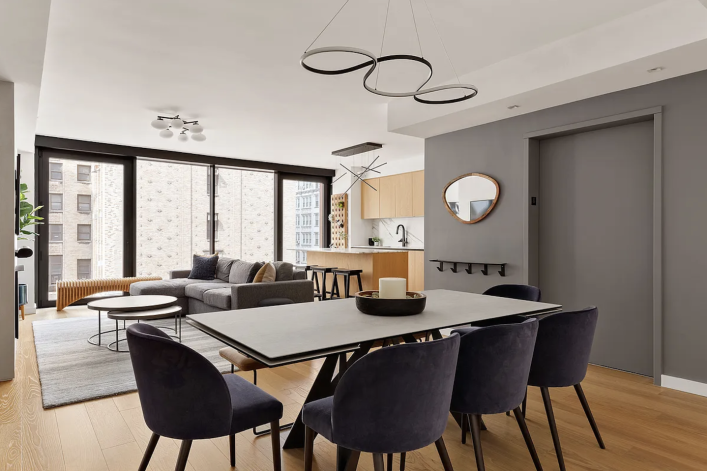
A private elevator opens onto the open living/dining of 139 East 23rd St., #8, a floor-through, two-bedroom condo in Kips Bay. It is listed for $2.7 million with a monthly common charge of $1,215.
Having a private elevator that opens directly into your New York City apartment sounds swanky—if you can afford it. But is it safe?
In this edition of Buy Curious, Brick turned to Sydney Blumstein, an agent at Corcoran, to hear about where you can find apartments with this amenity, who typically buys them, what security measures you should expect—and what to do when someone you don't know gets on the elevator heading to your apartment.
[Editor's Note: A previous version of this post was published in September 2023. We are presenting it again with updated information for August 2025.]
The question:
I’ve been thinking of buying an apartment with a private keyed elevator, but I’m concerned about safety. Do I need to worry about strangers getting into the elevator with me? How do these elevators work?
The reality:
Blumstein grew up in a converted loft with a keyed elevator and still spends a lot of time visiting her parents there, so she has firsthand experience with the ups and downs of this feature.
"First-time visitors are always mystified when they try to figure out how to get the elevator to move," she said. "And they are equally surprised to discover it opens directly into an apartment."
How do they work?
Most elevators have a key-lock system, which means a resident’s key allows access only to their floor. Residents can also buzz people in from their apartments.
"The front door of the elevator is locked and can only be opened by key or if someone is providing access. The elevator will not move without inserting the key into the lock inside the elevator or by the resident ringing you up," she said.
Her building uses a non-duplicatable Medeco key, which she said is fairly common in older buildings (and in all her listings) and that you must remember to turn the key back to the locked position after pressing the button that moves the elevator.
She noted that some buildings have key-locked elevators that serve all the units on each floor and open onto a common hallway. "For example, in an older building in Hudson Yards, they've put in a key system that automatically bounces back to the locked position for added security, so you don't have to rely on your neighbors to do this," she explained. A similar setup is at 104 Charlton St. in Hudson Square, where key-locked elevators open onto individual floors and a two-bedroom loft is on the rental market for $16,500 per month.
Private elevators in new construction often rely on magnetic cards in the elevator's control board, keypads with codes, and even fingerprint readers. The elevator door won’t open unless you enter the correct combination or access it with the correct key.
Where are they found?
As a luxury amenity, you can expect keyed elevators to be in large, floor-through, loft-style apartments and penthouse units.
And since these elevators are usually located in buildings with only one or two units per floor, the apartments tend to be more spacious than those accessed through common hallways.
"Historically, you find this in prewar buildings, namely warehouse conversions, in Greenwich Village, Soho, and tiny parts of Tribeca, where sometimes the buildings have been combined and the elevator will serve the east and west side," Blumstein said, adding "whereas in the Village you find the grander floor plans that are 2,500 square feet."
A recent search for "private elevator" on StreetEasy yielded 211 results, the majority of which were located on the Upper West and East sides of Manhattan and spread across Lower Manhattan, with a scattering in other neighborhoods, as well as Brooklyn.
Are they in condos or co-ops?
You can find them in both co-ops and condos like The Metropolitan, a new condo development in North Williamsburg. "These often have a huge freight elevator that serves two units with those giant doors that open on opposite sides into adjacent apartments," she said.
But in "older buildings like 55 East 11th, which is a conversion that went from warehouse to artist rental to co-op to what it is now, which is a higher-end co-op, the elevator just services one side of the building because the adjacent building has the exact same setup, as does the one across the street," she said.
There are, however, a number of condos with this feature (including the five listings below), so suffice it to say that you can find keyed elevators in both types of buildings and in a range of styles and eras, from brand-new towers to smaller prewar or mid-century locations.
Are these apartments more secure?
"Absolutely," Blumstein said, pointing to the fact that the elevator won't open or budge without a key or action by the resident.
Sometimes the apartments are in posh buildings with doormen; others (like hers) have a video intercom, which can be activated to view the interior of the elevator. You can often find buildings with steel gates just outside the elevator. For added security, cameras with multiple views and alarms are also commonly used.
Loft-style apartments typically feature entrance doors that lock between the elevator and the apartment. "We had one but honestly never used it because of the built-in safety of the keyed elevators," Blumstein said. "A key-locked apartment is as safe or even safer than having a doorman, which you can often breeze right by."
Do you have to worry about a stranger getting into the elevator with you?
"Hypothetically, sure, but in 30-plus years, my parents have never had this happen," she said, nor has she ever heard about anything from her neighbors—and it's a tight-knit group.
Indeed, loft buildings are generally small—one or maybe two units per floor—so you'll more than likely know your neighbors and can look out for each other.
In new construction condos, there's usually a doorman who will only allow residents or their guests to enter the building.
And if you ever do find yourself in the elevator with someone unfamiliar, remember that without special key access, the door will not open on your floor.
Does having a private elevator add to the price?
"Anything that makes a place unique adds to the price these days," Blumstein said.
She reported seeing a significant uptick in buyer interest in unusual spaces "because there's so much homogeneity being created in the marketplace and a lot of similar materials—how many times are you going to see a Bosch dishwasher? So it's about having something that stands out."
A keyed elevator is particularly appealing for people who don't necessarily want to interact with a doorman or have to tip them during the holidays. Plus, at least in older loft buildings, "there's a sense of community where the neighbors collaborate to buzz in deliveries so packages are left in the hallway or the elevator, which is safer than in the lobby or package rooms," Blumstein said, speaking from experience.
"And after a 20-year chapter of raze and rebuild," Blumstein added, "the idea that we are still honoring spaces with keyed elevators makes me feel like we are leaning into the prewar beauty that makes New York so special."
Check out these apartments with direct elevator access.
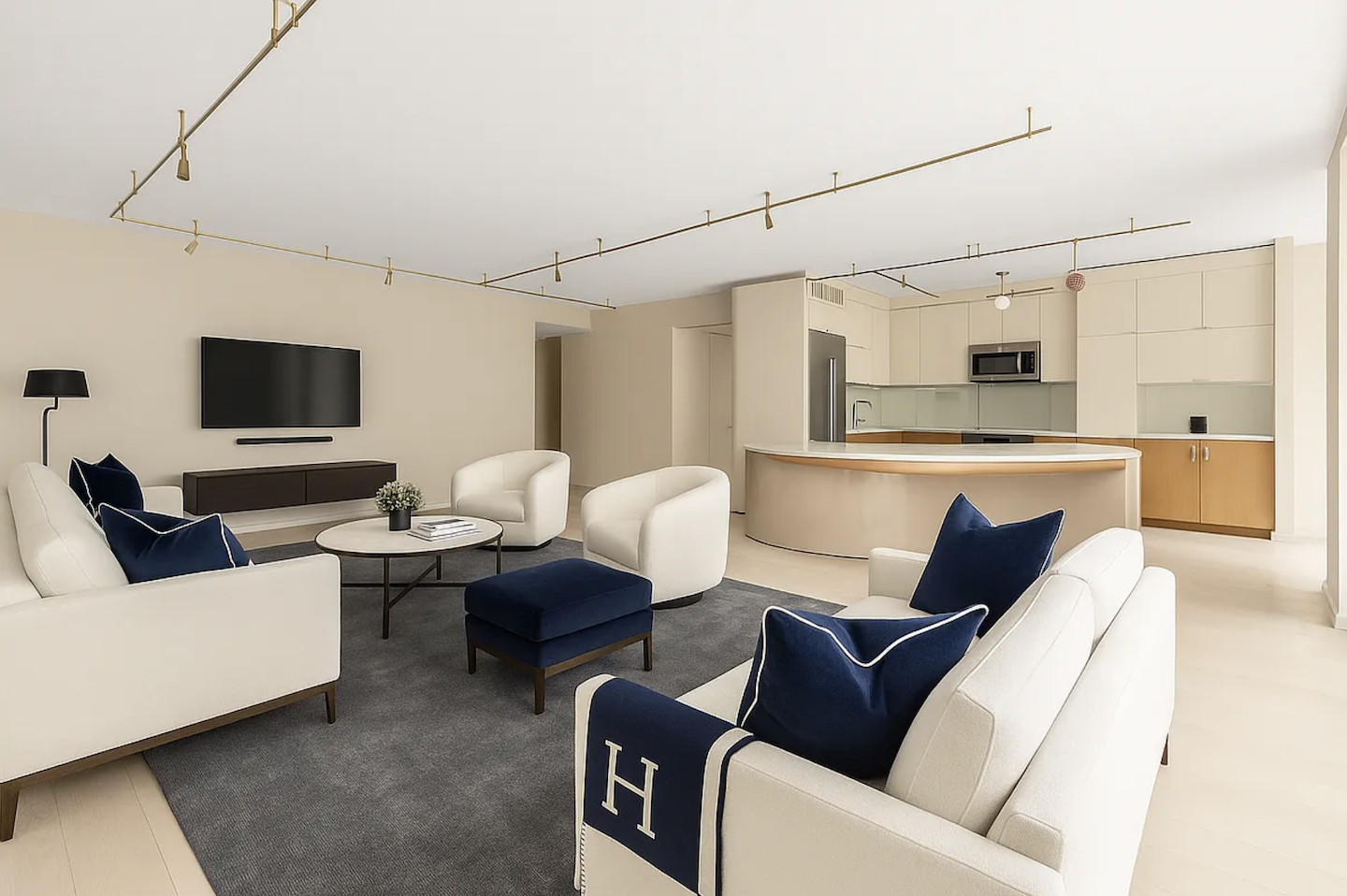
52 Park Ave., #5, Murray Hill
This full-floor apartment is on the seventh floor of a boutique 17-unit condo dating to 1998, with a 24-hour doorman and landscaped rooftop terrace. It has two bedrooms and two full baths spanning 1,231 square feet. The glass-walled interior offers views of the Chrysler Building. The dual private keyed elevators lead to a large foyer and a glass-walled interior offering views of the Chrysler Building and Manhattan skyline. Other features include a chef's kitchen, central air, and an in-unit washer/dryer. The asking price is $1.695 million; the monthly common charge is $2,600.
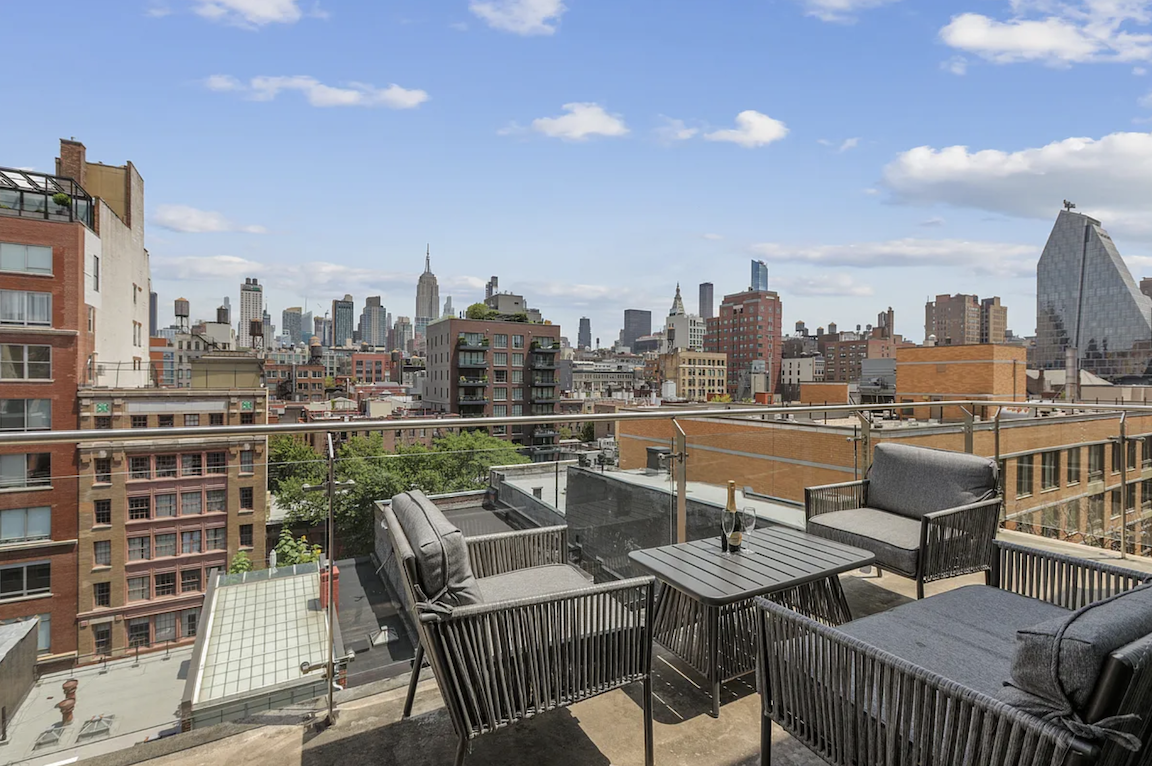
135 West 14th St., #8, Chelsea
Located in Loft 14, a luxury condo building known for its post-modern, cantilevered design, this full-floor, 2,050-square-foot, two-bedroom, two-bath unit is on the market for $3.75 million, with $2,344 in monthly common charges. A private elevator landing leads to a great room with 11-foot ceilings, wide-plank hardwood floors, oversized windows, and large south-facing terrace. A second terrace is accessed via the primary suite. The eat-in kitchen has integrated high-end appliances and a large island. The nine-unit, 11-story building with virtual doorman service was built in 2009.
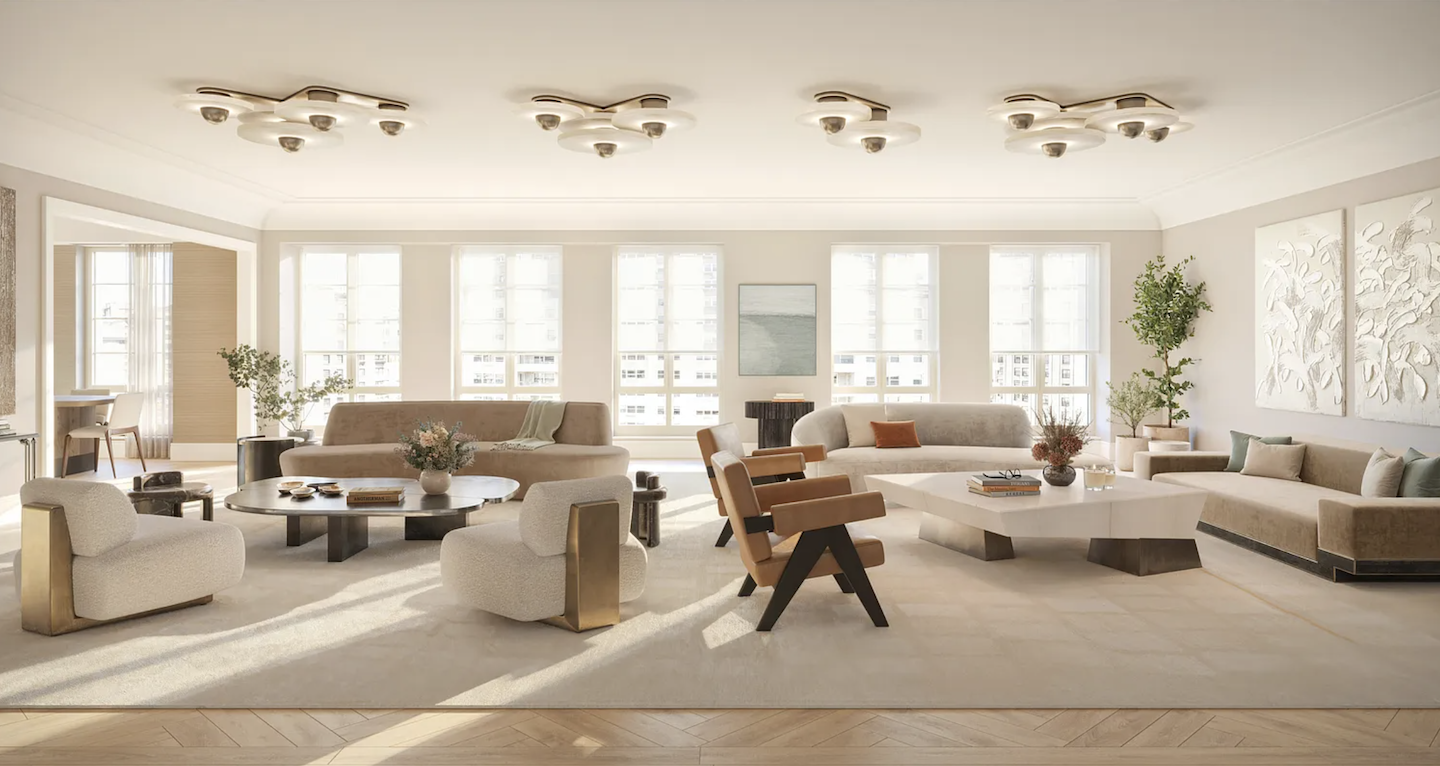
16 Fifth Ave., #6, Greenwich Village
Accessed by private elevator, this four-bedroom, four-and-a-half-bath condo is 3,727 square feet and has white oak floors throughout. The designer chef's kitchen features custom cabinetry, Calacatta Gold marble countertops and backsplash, a seven-foot island, and a wine refrigerator. It is one of 14 full-floor units at Sixteen Fifth Ave., a boutique 21-story building by Robert A.M. Stern Architects, where amenities include a 24-hour attended lobby, fitness center, golf simulator, tranquility lounge, catering kitchen and private dining room, and residents' bar. The sponsor unit is asking $13.5 million; the monthly common charge is $1,776.
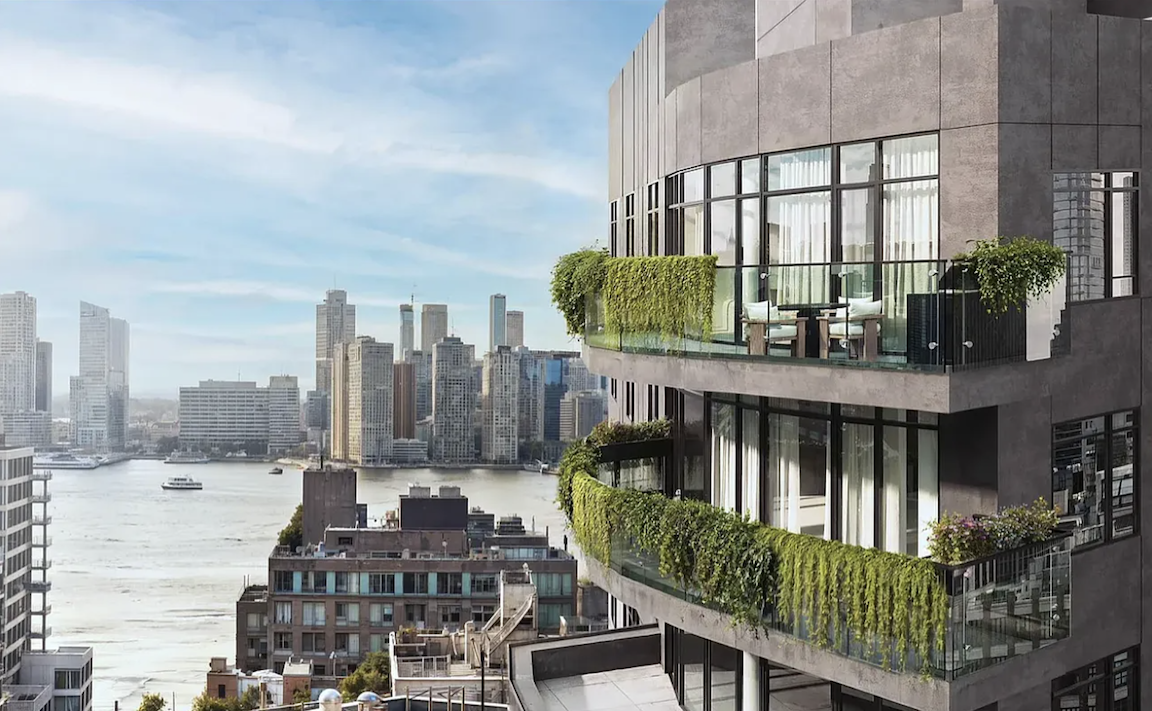
219 Hudson St., #PH9, Hudson Square
This 2,013-square-foot, four-bedroom, three-and-a-half-bath penthouse featuring a private elevator and a 200-square-foot wrap-around balcony is one of 14 units at the 10-story boutique condo, built in 2022. The full-floor unit is listed for $4.5 million, with a monthly common charge of $1,588. The expansive open-concept living space has wide-plank white oak flooring, 10-foot-plus ceilings, and oversized, sound-resistant casement windows. Central AC and an in-unit washer/dryer round out the features. Building amenities include virtual doorman services, a fitness center, and available private storage.
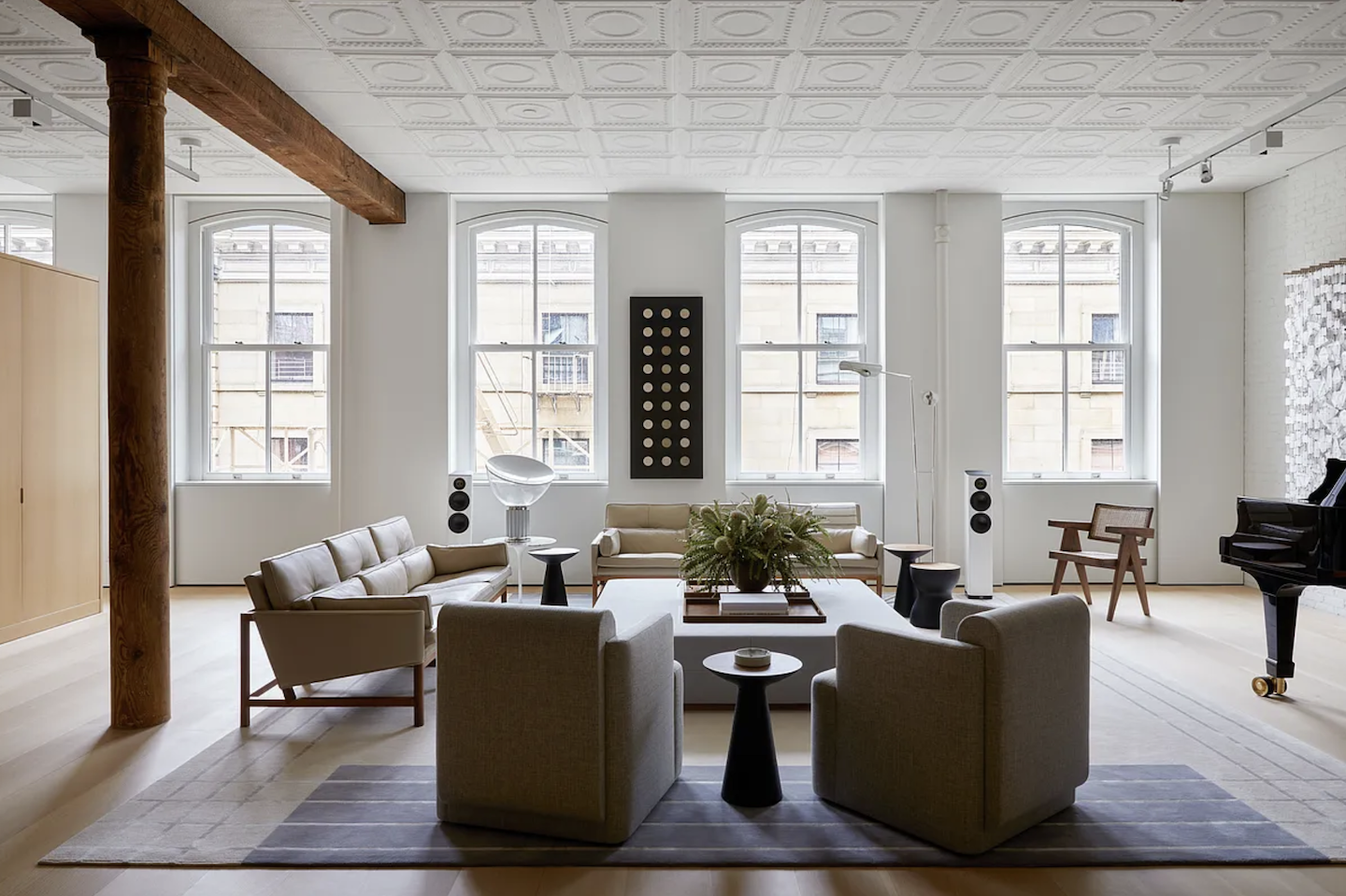
100 Grand St., #4, Soho
Listed for $6.5 million, this 2,800-square-foot, two-bedroom, two-bath loft features a 1,300-square-foot great room with soaring ceilings and an adjoining state-of-the-art kitchen with custom cabinetry, marble countertops, and an extended dining bar. The private elevator opens onto two hallways, each leading to a private bedroom suite at opposiite ends of the floor plan. Original details include wooden columns, brick walls, and pressed-tin ceilings, while wide-plank white oak floors and a Lutron lighting and shade system are modern updates. The cast-iron, circa-1910 building has six units on six stories. The monthly common charge is $4,800.
—Previous versions of this article contained reporting and writing by Leah Hochbaum Rosner.
You Might Also Like













